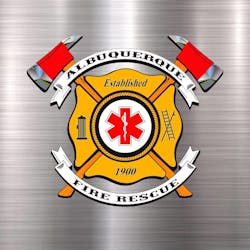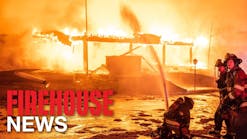NM Fire Department's 'Cost Recovery' Fee Passes
By Jessica Dyer
Source Albuquerque Journal, N.M.
ALBUQUERQUE, NM—With several members calling it the responsible thing to do, the Albuquerque City Council on Wednesday approved allowing the fire department to send bills for responding to certain car crashes and fires.
Albuquerque Fire Rescue’s proposed “cost recovery” fee passed on a 7-2 vote following a lengthy discussion about the need for and merits of such a plan.
The fire department has said the idea was prompted by complicated crashes involving commercial vehicles like fuel tankers – incidents that require extensive mitigation and can take firefighters away from other calls for several hours.
The new ordinance permits AFR to send invoices after extinguishing car fires or performing hazardous material mitigation or cleanup at crash scenes – but only if the work totals more than $1,500 in fees.
RELATED:
Department leaders told the Council that the ordinance – as recently amended – would likely trigger bills for only 5-10% of the approximately 8,600 crashes AFR tends to annually, and that they plan to send invoices to insurance companies and not directly to citizens.
“This wouldn’t (apply to) every fender-bender that goes on in the city of Albuquerque,” AFR Chief Paul Dow said. “But I think we have to be responsible with the resources we do have.”
Dow said his crew once spent 19 hours at a tanker truck rollover that would have generated $32,000 for the department had the fee been in place then.
Prior to voting in favor of the bill, Councilor Don Harris said not billing for labor-intensive responses could be tantamount to subsidizing insurance companies. Councilor Diane Gibson said the fee made sense.
“I think it’s important for the city to be able to protect itself financially from exorbitant costs that are incurred when there is an insurance company that insures exactly for that,” she said.
But Councilors Trudy Jones and Brad Winter raised various concerns before voting against it, with Jones questioning the necessity of a new fee after the city raised taxes last year, largely to support public safety. That tax is expected to generate enough to spend $53.1 million annually.
Jones – who had recently voiced support for the cost recovery fee – changed course Wednesday.
“I don’t understand how we can – sorry, chief – do this in good faith when we’re already having an additional $53.1 million on an annual basis,” she said.
Sarita Nair, the city’s chief administrative officer, responded that the fire department has benefited, but that most of the new money will go to salaries for the 400 police officers the city plans to hire.
The ordinance grants AFR authority to bill the “responsible party” after a qualifying accident – which includes individuals. Deputy Chief Adam Eakes said in an interview the department did not intend to initiate invoices when there is no known insurance company.
Internal AFR policy also prohibits sending any individuals to collections for unpaid bills.
While AFR says other communities have implemented similar cost recovery fees, local opponents have argued their taxes should already cover such services.
As originally written, AFR’s proposal would have enabled AFR to bill for extinguishing any car fire or providing any level of hazardous materials cleanup or using heavy equipment for extractions.
The department rewrote it last week, eliminating bills for extractions and defining the scope of qualifying incidents to those with at least $1,500 in fees.
Hazardous material cleanup or car fire response has a base fee of $600. After the first hour, the department will begin charging an hourly rate based on the value of the reporting vehicles – $600 for a fire engine, for example.
Eakes said the response to a typical car crash is 27 minutes, eliminating most from fee consideration.
The ordinance also gives the fire chief discretion to waive or reduce fees, implement collection procedures in a dispute with an insurance company or make other modifications to an invoice “if a showing of financial hardship or inability to pay is made.”
———
©2019 the Albuquerque Journal (Albuquerque, N.M.)
Visit the Albuquerque Journal (Albuquerque, N.M.) at www.abqjournal.com
Distributed by Tribune Content Agency, LLC.






